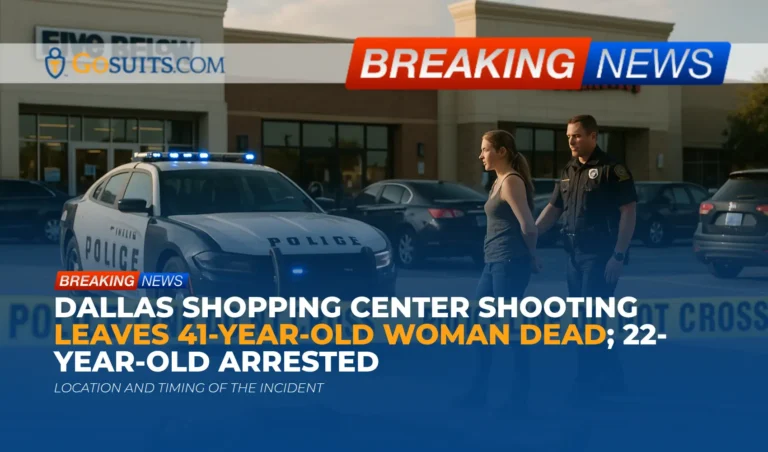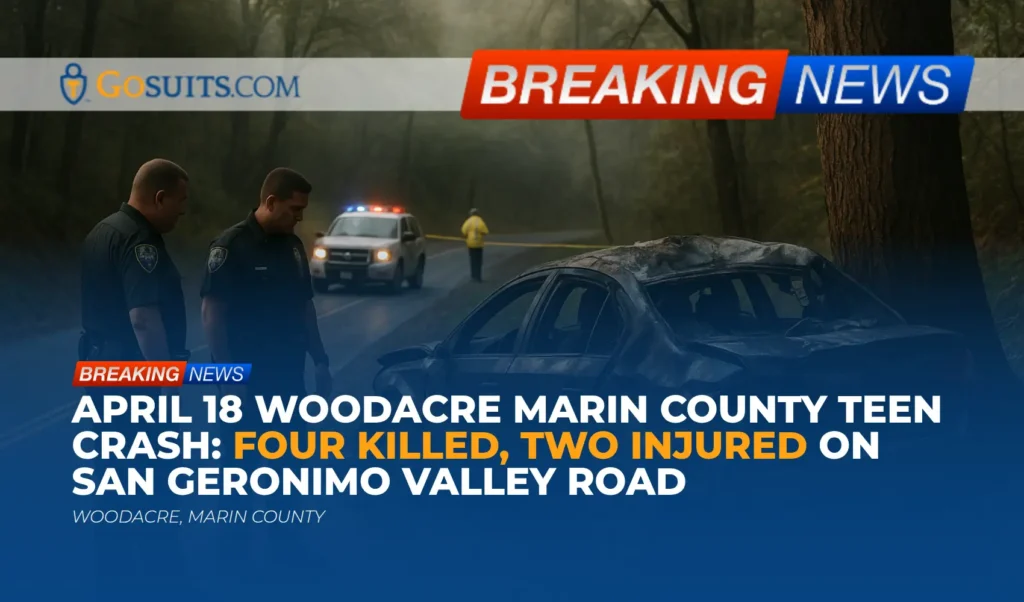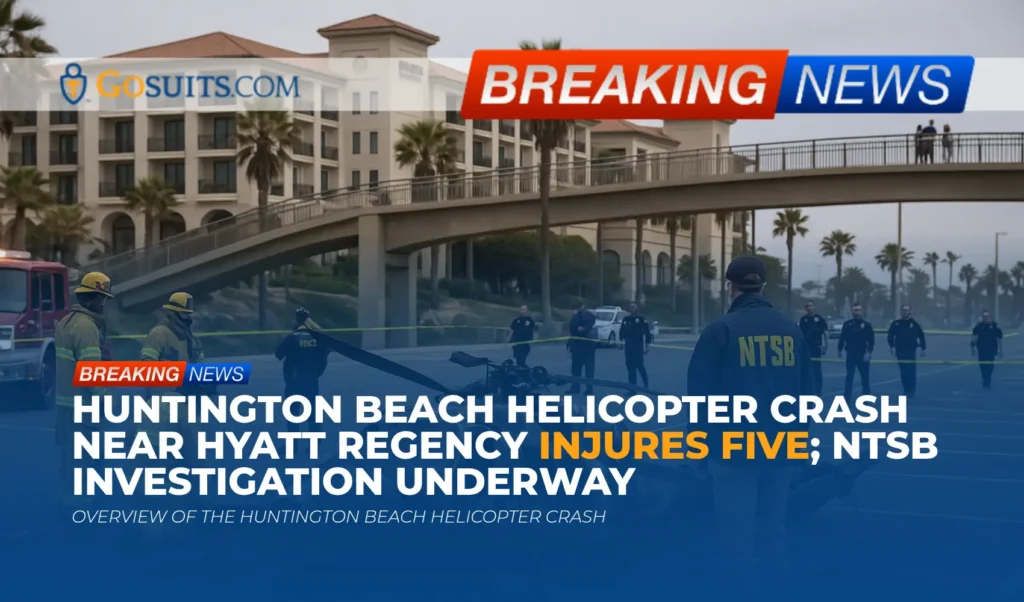- Overview and latest updates
- Key facts established so far
- Location and timing of the incident
- What authorities have reported and how to share information
- Civil options after a fatal shooting at a shopping center
- Potential liability: individual shooter and property owners
- Evidence and official records: how to obtain what you may need
- Insurance and financial assistance that may be available
- Practical steps to consider now
- Timelines and statutes in Texas
- Community care and safety considerations
- Commentary from Gosuits Dallas, Texas Personal Injury Attorney
- Action steps and why timing matters
Overview and latest updates
A tragic confrontation in a Dallas shopping center escalated into gunfire, resulting in the death of a 41-year-old woman. According to information shared by Dallas authorities, the dispute began after an interaction leaving a Five Below store and continued at a nearby PetSmart in the same shopping center. A 22-year-old woman was later arrested on a murder charge. The investigation remains open as detectives seek additional information and evidence, including any footage or witness accounts that may help complete the timeline of events.
Incidents like this are devastating for families and the broader community. While criminal proceedings will address potential violations of criminal law, families often have questions about civil rights, how to obtain official records, what evidence matters for a potential wrongful death claim, and what steps can help protect their interests. This article provides general information to help families understand the process, what to document, where to look for official records, and how civil liability may be evaluated after a fatal shooting in a retail setting.
Key facts established so far
What happened
Police reports indicate that a disagreement began after a door was held open at a Five Below store. The situation moved to a nearby PetSmart, where store employees reportedly asked those involved to leave after verbal disputes. In the parking lot, a physical altercation occurred. During that encounter, a handgun was produced and fired, striking the 41-year-old woman multiple times. She was transported by Dallas Fire-Rescue to Methodist Central Hospital and pronounced deceased.
Who was involved
Authorities identified the decedent as a 41-year-old woman and stated that a 22-year-old woman was arrested later that day on a murder charge. Names and additional parties have been reported publicly; however, because investigations evolve, official records are the most reliable source for confirmed details about each person’s role and statements.
Where the incident unfolded
The events occurred at the Wheatland Towne Crossing shopping center in the 2500 block of West Wheatland Road in Dallas. Surveillance footage reportedly captured portions of the incident and the vehicle involved.
Law enforcement actions
Police say the suspect left the scene, was located later in Dallas, and taken into custody the same evening. The investigation remains active. Officials have invited community members who may have seen or recorded anything to come forward.
Location and timing of the incident
Police responded around 1 p.m. on a weekday afternoon to calls about a shooting at Wheatland Towne Crossing. The time and location matter in civil evaluations because factors such as store hours, staffing, prior incidents at the location, lighting, camera placement, and security patrol schedules can be relevant to potential civil claims, including negligent security.
When a violent incident happens in a retail parking lot, investigators typically look at the sequence of events before, during, and after the confrontation. This includes identifying potential witnesses inside stores, at adjacent businesses, and in the parking lot; determining what each business knew and when; understanding whether staff or security intervened; and evaluating how quickly first responders were contacted.
What authorities have reported and how to share information
The Dallas Police Department has indicated that the investigation remains ongoing. Individuals with information are asked to contact the lead detective assigned to the case. If you saw the incident, heard relevant statements, or captured images or video around the time of the confrontation, those materials may be important.
If you need to submit information or clarify whether a tip is relevant, consider contacting the Dallas Police Department’s homicide unit and referencing the date, time, and location of the shooting. The department identified a point of contact for information sharing in this matter: Detective T. Gross (#9896), reachable at 214-671-3143 or theodore.gross@dallaspolice.gov.
Separately, if you later need to request public information related to the incident, Texas law allows members of the public to request certain government records through the Public Information Act. Guidance on making a request is available from the Texas Attorney General’s Office at https://www.texasattorneygeneral.gov/open-government/members-public/making-public-information-request. Some sensitive information, including portions of offense reports, 911 recordings, or investigative materials, may be withheld under statutory exceptions until an investigation is complete.
Civil options after a fatal shooting at a shopping center
Criminal responsibility and civil accountability are separate. Even when a suspect is arrested and charged, families may also pursue civil claims to address the many losses that occur after a wrongful death. In Texas, two primary civil pathways may apply in a fatal incident caused by the wrongful act, neglect, carelessness, unskillfulness, or default of another:
- Wrongful death claims: These may be filed by the surviving spouse, children, and parents of the decedent. If these family members do not file within a set period, the decedent’s executor or administrator may file on their behalf. See Texas Civil Practice and Remedies Code Chapter 71 at https://statutes.capitol.texas.gov/Docs/CP/htm/CP.71.htm.
- Survival claims: Separate from wrongful death, a survival action allows the decedent’s estate to recover for the decedent’s own damages that occurred between the injury and death, such as conscious pain and suffering and medical expenses. See Texas Civil Practice and Remedies Code § 71.021 at https://statutes.capitol.texas.gov/Docs/CP/htm/CP.71.htm#71.021.
Damages in wrongful death and survival cases are highly fact-specific. Families often seek compensation for loss of financial support, loss of household services, loss of companionship and society, mental anguish, and funeral and burial expenses, among others recognized under Texas law. Survival claims may also include medical bills and the decedent’s pain and suffering prior to death. The availability and measure of damages depend on the evidence.
Potential liability: individual shooter and property owners
Claims against the individual who fired the shots
If evidence shows that an individual intentionally or negligently caused another person’s death, the person may face civil liability for wrongful death and survival damages. Collections against individuals are often limited by personal assets and any applicable insurance. Many personal liability policies exclude intentional acts, but it is still critical to investigate all possible coverage, endorsements, or other sources of recovery.
Evaluating potential claims against businesses or property owners
In addition to claims against an individual, families sometimes explore whether a property owner or manager may share civil responsibility under premises liability or negligent security. Texas law imposes a duty on property owners to use ordinary care to make their premises reasonably safe for invitees. When a patron is harmed by criminal conduct of a third party, courts analyze whether the criminal act was foreseeable and whether the property owner failed to take reasonable measures to reduce or prevent the risk under the circumstances.
Two Texas Supreme Court decisions commonly cited in these analyses provide helpful guidance:
- Del Lago Partners, Inc. v. Smith: The Court held a premises owner could be liable for injuries from a bar brawl where the owner had actual knowledge of a prolonged, escalating confrontation and failed to take reasonable steps to protect patrons. See the opinion at https://www.txcourts.gov/media/899928/090239.pdf.
- Foreseeability framework in third-party criminal acts: Texas courts examine the proximity, recency, frequency, and similarity of prior incidents, and whether a disturbance was ongoing or escalating, to determine if a risk was foreseeable and required reasonable precautions. While each case turns on its facts, courts look to the totality of circumstances to decide whether a duty was owed and breached.
Applying those principles, a civil investigation into a shopping center shooting may ask:
- Notice and escalation: Did employees or management become aware of verbal or physical confrontations on the premises? For how long? What exactly did they observe?
- Response: What steps did staff or security take once a confrontation escalated? Were patrons asked to separate or leave? Were security or police contacted?
- Security measures: What lighting, cameras, patrols, or protocols were in place? Were cameras functioning and positioned to capture high-risk areas like entryways and parking lot lanes?
- Prior incidents: Were there prior similar incidents on or near the property that would make violence in the parking lot foreseeable?
- Policies and training: Did the property maintain reasonable policies and training for handling escalating disputes?
No conclusion about civil fault should be drawn without the full record: offense reports, witness statements, video, store policies, security vendor records, and any prior incident data. What matters is what the businesses knew or should have known and whether they acted reasonably under the circumstances.
Evidence and official records: how to obtain what you may need
Gathering reliable records early helps preserve options. Below are common records and how they are typically obtained in Texas. Availability can vary based on investigative status, privacy laws, and who is requesting the records.
Police offense report and supplemental records
– Where to request: The Dallas Police Department is the custodian of the offense report and many related materials. Requests for public information are made under the Texas Public Information Act. Guidance on how to make a request is available at the Texas Attorney General’s site: https://www.texasattorneygeneral.gov/open-government/members-public/making-public-information-request.
– What to expect: Some details may be redacted or temporarily withheld while an investigation is active under statutory exceptions. Once a case is closed or reaches certain stages, more information may be released.
911 audio, CAD logs, and call notes
These records can help establish timelines. They are requested from the law enforcement agency or dispatch authority via the Public Information Act. Availability can be limited by privacy and investigative exceptions. See the Texas Attorney General’s open government guidance noted above.
Autopsy report and inquest records
In Texas, death investigations are governed by Chapter 49 of the Code of Criminal Procedure, which sets out the role of medical examiners and justices of the peace in conducting inquests and ordering autopsies when required. The statute is available at https://statutes.capitol.texas.gov/Docs/CR/htm/CR.49.htm.
In Dallas County, the medical examiner’s office ordinarily maintains autopsy and toxicology reports. Next of kin may request copies after the inquest is complete. Identification documents are typically required. If you are unsure where to start, contacting the county medical examiner’s office or the justice court that handled the inquest can help clarify the process for your specific case.

Death certificates
Certified Texas death certificates are issued through the Texas Department of State Health Services Vital Statistics Section or the local registrar. Information on eligibility, required documents, and how to order is available at https://www.dshs.texas.gov/vital-statistics/death-records. These certificates are often needed for insurance claims, estate matters, and benefits applications.
Hospital and EMS records
Dallas Fire-Rescue and hospital records, such as EMS reports and medical records from the receiving hospital, can document the nature of injuries, life-saving measures, and timing. Release of medical records typically requires appropriate authorization by next of kin or the personal representative of the estate. Contact the hospital’s health information management department for their specific process.
Business surveillance video and incident reports
Retailers and property managers may have surveillance video, incident reports, security logs, and internal communications. Because data may be overwritten quickly, it is important to send a prompt written preservation request to the businesses and any third-party security vendors. This is often referred to as a spoliation or preservation letter.
Insurance and financial assistance that may be available
Liability insurance
– Property owners and managers typically carry commercial general liability insurance that may respond to certain premises claims, depending on the policy language and facts. Intentional criminal acts by third parties are complex coverage issues, and exclusions may apply, but negligent security claims are often evaluated under these policies.
– Individuals may have personal liability coverages through homeowners, renters, or other policies. Many policies exclude intentional acts, yet every policy is unique. A careful review of all potentially applicable policies is warranted.
Before speaking with any insurance adjuster, it is prudent to consult with an attorney. Statements made to insurers can be recorded and later used in ways that affect civil claims and outcomes.
Texas Crime Victims’ Compensation Program
The Texas Office of the Attorney General administers the Crime Victims’ Compensation Program, which may help eligible victims and families with certain out-of-pocket costs after violent crime, such as funeral expenses, counseling, and loss of support within statutory limits. Program information is available at https://www.texasattorneygeneral.gov/crime-victims. Filing deadlines and documentation requirements apply, so reviewing the program guidance early can be helpful.
Other possible resources
- Employer benefits: Some employers offer group life insurance, bereavement benefits, or employee assistance programs.
- Private life insurance: Verify beneficiaries and claim procedures; certified death certificates are usually required.
- Community and counseling services: Grief counseling, support groups, and faith-based organizations can assist families in crisis.
Practical steps to consider now
- Preserve evidence immediately: Save any texts, emails, or social media messages; note the names and contact details of witnesses; and photograph the scene, vehicle damage, or clothing if available. Send written preservation notices to involved businesses requesting retention of all video for several hours before and after the incident.
- Obtain key records methodically: Track requests for offense reports, 911 logs, autopsy reports, and hospital records. Keep copies of all correspondence and delivery confirmations.
- Document losses: Maintain a file with funeral expenses, travel costs, income records, and any counseling or support service receipts.
- Be cautious with insurance communications: Consider consulting an attorney before speaking to any insurance company. What is said in early calls can be used against claimants later.
- Open an estate when appropriate: Survival claims and access to certain records may require formal appointment of a personal representative. Probate counsel can advise on whether an estate should be opened.
- Respect mental health and family needs: Access supportive services as needed; significant trauma often requires ongoing care and time.
Timelines and statutes in Texas
Most wrongful death and personal injury claims in Texas must be filed within two years of the date of injury or death, subject to limited exceptions. See Texas Civil Practice and Remedies Code § 16.003 at https://statutes.capitol.texas.gov/Docs/CP/htm/CP.16.htm#16.003. Because evidence can be lost and deadlines can be complex, timely action is important.
Wrongful death claims may be brought by the surviving spouse, children, and parents. If these beneficiaries do not bring suit within three months, the decedent’s executor or administrator may file unless specifically asked not to by the beneficiaries. See Texas Civil Practice and Remedies Code Chapter 71 at https://statutes.capitol.texas.gov/Docs/CP/htm/CP.71.htm.
Community care and safety considerations
Public areas such as retail parking lots bring together hundreds of people daily. After a serious incident, businesses often review their safety procedures, staffing, and security measures. Community members can help by sharing information with investigators, supporting those directly affected, and promoting conflict de-escalation practices.
For families, grief and recovery are not linear. Counseling, peer groups, and culturally or spiritually aligned services can be invaluable. Documenting the emotional and practical impact of a loss is also important for civil claims that recognize mental anguish and loss of companionship and society under Texas law.
Commentary from Gosuits Dallas, Texas Personal Injury Attorney
Our thoughts are with the family and loved ones impacted by this heartbreaking loss. The details reported describe a chain of events that began with words and escalated to violence in a public shopping area, which is deeply troubling for any community. This commentary is offered for educational purposes and general information to help explain how civil claims are evaluated after a fatal incident, what evidence is important, and why timely steps matter.
From a civil perspective, two areas of responsibility are commonly examined in a case like this: the individual use of a firearm during a confrontation and the environment in which the confrontation unfolded. When store employees witness an escalating dispute or when prior incidents on or near the property suggest a risk of violence, courts analyze what a reasonable property owner or manager should do in response. The Texas Supreme Court has made clear that when a disturbance is evident and escalating, reasonable steps to protect patrons may be required, depending on the facts, as reflected in decisions such as Del Lago Partners v. Smith. The ultimate question is always evidence-driven: what the businesses knew or should have known and whether the measures they took were reasonable under the circumstances.
Insurance carriers and large corporations often move quickly after a serious incident. Adjusters may seek recorded statements, early releases, or narrow disclosures that can limit future claims. Property owners may have incident reports and videos that are routinely deleted if not promptly preserved. Without guidance, families can be placed at a disadvantage simply because they do not know what information exists or how to protect it. Ensuring that evidence is preserved, that communications with insurers are handled thoughtfully, and that all potential sources of recovery are identified can make a significant difference in the civil process.
A free consultation can help clarify rights and options, answer questions about records and timelines, and identify the next practical steps. Speaking with a seasoned and skilled attorney before engaging with any insurance company helps reduce the risk of statements being used out of context and helps ensure preservation of evidence critical to a fair evaluation of the claim.
Action steps and why timing matters

What to do
- Secure official records: Request police offense reports as permitted by law, track 911/CAD requests, and obtain autopsy and death certificates when available.
- Send preservation notices: Promptly ask involved businesses and security vendors to preserve all surveillance and incident records for the day of and the days surrounding the incident.
- Centralize documentation: Keep a single file for funeral costs, counseling expenses, employment and income records, and any benefits paperwork.
- Consult an attorney first: Before contacting any insurance carrier, obtain a free consultation to understand rights and obligations. What is said to insurers can be used later and may affect available claims.
Why act now
- Evidence fades: Many surveillance systems overwrite footage in days or weeks, and witness memories fade quickly. Early preservation is essential.
- Deadlines apply: Civil claims in Texas generally have a two-year statute of limitations, and some benefits programs have shorter filing deadlines. Acting early helps avoid missed windows.
- Insurance positioning: Insurers often conduct early interviews and may seek to shape the narrative. Preparing before speaking with them protects the integrity of the claim.
Context that matters
- Multiple avenues of responsibility: Claims may involve individuals and businesses. Each path has different standards of proof and insurance considerations.
- Coordination with investigations: Civil efforts should be coordinated with ongoing police investigations to avoid interference while still preserving rights.
- Family well-being: Access to counseling and support is part of both healing and documenting the harm recognized by civil law.
Preserve Evidence Today Schedule a Free Consultation Do Not Speak to Insurers Yet
Helpful official resources
- Texas Public Information Act requests: https://www.texasattorneygeneral.gov/open-government/members-public/making-public-information-request
- Texas Crime Victims’ Compensation: https://www.texasattorneygeneral.gov/crime-victims
- Texas wrongful death law: https://statutes.capitol.texas.gov/Docs/CP/htm/CP.71.htm
- Survival action statute: https://statutes.capitol.texas.gov/Docs/CP/htm/CP.71.htm#71.021
- Two-year statute of limitations (most cases): https://statutes.capitol.texas.gov/Docs/CP/htm/CP.16.htm#16.003
- Inquest and autopsy law (Texas CCP Ch. 49): https://statutes.capitol.texas.gov/Docs/CR/htm/CR.49.htm
- Del Lago Partners v. Smith (premises safety during brawl): https://www.txcourts.gov/media/899928/090239.pdf






